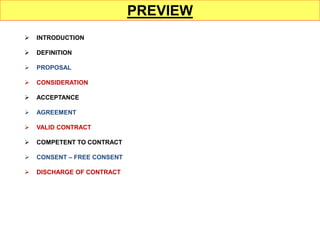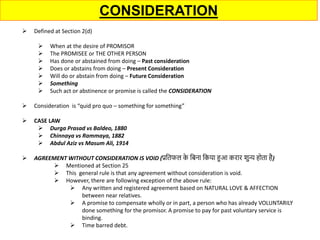The Indian Contract Act of 1872 outlines the framework for contracts in India, detailing definitions and types of proposals, acceptance, consideration, and the legal capacity to contract. It emphasizes the necessity of free consent and the enforceability of agreements, while also addressing issues related to minors and unsound minds in contractual situations. Key sections discuss the formation, revocation, and validity of contracts, as well as exceptions to the general rules governing agreements.









![ACCEPTANCE
THE ACCEPTANCE CAN BE EXPRESSED OR IMPLIED. :- SECTION-9
The express acceptance means through word of mouth or by piece of writing.
The implied acceptance means to infer from the conduct of parties.
It is termed as proposal acceptable by conduct i.e. Acceptance by Performance.
The communication of acceptance is not necessary as it is required for the benefit of the
person who makes the offer/proposal and he may dispense the communication.
SECTION 8: Acceptance by performing conditions, or receiving consideration.—
Performance of the conditions of a proposal, or the acceptance of any consideration for a
reciprocal promise which may be offered with a proposal, is an acceptance of the proposal
CASE LAW
Вrоgdеn v. Меtrороlіtаn Rаіlwау Со.,1877
Mere silence to a proposal is not termed as acceptance i.e. not consider as a valid acceptance.
However, mere silence to a proposal coupled with conduct of parties will make the acceptance as a
valid acceptance under Section 8 of ICA, 1872.
CASE LAW
Felthouse v Bindley [1862] EWHC CP J35](https://image.slidesharecdn.com/ica-1872-240418162943-d843a763/85/Indian-Contract-Act-1872-presentation-pptx-10-320.jpg)


























![VOID AGREEMENT
Defined at Section 2(g)
An agreement not enforceable by law is said to be void.
It is of Two types
Known To Be VOID Agreement. – Void ab initio
Discovered to be Void Agreement.
In case of breach, the court cannot enforce the observation of legal rights and duty of any parties.
Known To Be VOID Agreement. – Void ab initio
(1) Agreements of which consideration and objects are unlawful in part,[S. 24]
(2) Agreements without consideration, [S. 25]
(3) Agreements in restraint of marriage, [S. 26]
(4) Agreements in restraint of trade, [S. 27)
(5) Agreements in restraint of legal proceedings, [S. 28]
(6) Unmeaning/Uncertainty agreements, [S. 29]
(7) Wagering agreements, [S. 30] and
(8) Agreements to do impossible acts. [S. 56]](https://image.slidesharecdn.com/ica-1872-240418162943-d843a763/85/Indian-Contract-Act-1872-presentation-pptx-37-320.jpg)





![DISCHARGE OF CONTRACT - PERFORMANCE
SECTION 43: - Joint and Several
Any one of joint promisors may be compelled to perform. —
When two or more persons make a joint promise, the promisee may, in the absence
of express agreement to the contrary, compel any [one or more] of such joint
promisors to perform the whole of the promise.
Each promisor may compel contribution. —Each of two or more joint
promisors may compel every other joint promisor to contribute equally with
himself to the performance of the promise, unless a contrary intention appears
from the contract.
Sharing of loss by default in contribution. —If any one of two or more joint
promisors makes default in such contribution, the remaining joint promisors must
bear the loss arising from such default in equal shares.
Explanation. —Nothing in this section shall prevent a surety from recovering,
from his principal, payments made by the surety on behalf of the principal, or
entitle the principal to recover anything from the surety on account of
payments made by the principal.](https://image.slidesharecdn.com/ica-1872-240418162943-d843a763/85/Indian-Contract-Act-1872-presentation-pptx-43-320.jpg)











